

Tackling 'Wicked' Problems – A Public Policy Perspective - Pro Bono Australia. Wednesday, 24th July 2013 at 9:41 am By Lina Caneva, Editor In today's Impact Opinion, Dawn O’Neil AM and Kerry Graham call for the private sector to be recognised as a key stakeholder and contributor in solving complex and ‘wicked’ social problems.
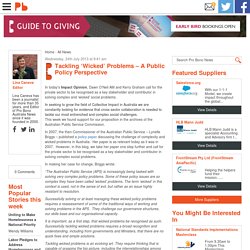
8287. Planning with Complexity: An Introduction to Collaborative Rationality for ... - "Ready, Fire, Aim, Re-Fire, Aim" Systems Thinking For Social Change: A Practical Guide to Solving Complex ... - David Peter Stroh. Donors, leaders of nonprofits, and public policy makers usually have the best of intentions to serve society and improve social conditions.
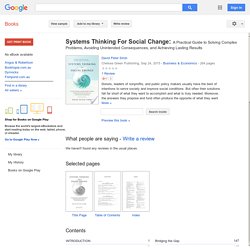
But often their solutions fall far short of what they want to accomplish and what is truly needed. Moreover, the answers they propose and fund often produce the opposite of what they want over time. We end up with temporary shelters that increase homelessness, drug busts that increase drug-related crime, or food aid that increases starvation. W3 Nelson TheDesignWay Chapt 1. Ajbms201211i11111. Wicked. Tackling wicked problems : A public policy perspective - APSC. Commissioner’s foreword The Australian Public Service (APS) is increasingly being tasked with solving very complex policy problems.
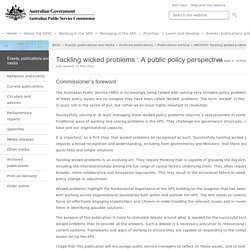
Some of these policy issues are so complex they have been called ‘wicked’ problems. The term ‘wicked’ in this context is used, not in the sense of evil, but rather as an issue highly resistant to resolution. The Heretic's Guide to Best Practices: The <i>Reality</i> of Managing Complex ... - Paul Culmsee; Kailash Awati. When it comes to solving complex problems, we often perform elaborate rituals in the guise of best practices that promise a world of order, certainty, and control.

But reality paints a far different picture, which practitioners are often reluctant to discuss. A witty yet rigorous journey through the seedy underbelly of organisational problem solving, The Heretic’s Guide to Best Practices pinpoints the reasons why best practices don’t work as advertised and what can be done about it. “Hugely enjoyable, deeply reflective, and intensely practical. Wicked. Wicked Solutions : A Systems Approach to Complex Problems - Bob Williams, Sjon van 't Hof. Planning for Complexity. Planning is a challenge even in the best of times.
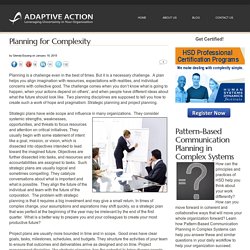
But it is a necessary challenge. A plan helps you align imagination with resources, expectations with realities, and individual concerns with collective good. Untitled. In this article, we argue that Niklas Luhmann has a lot to offer present-day planning theory.
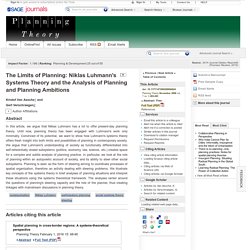
Until now, planning theory has been engaged with Luhmann's work only minimally. Convinced of its potential, we want to show how Luhmann's systems theory offers fresh insight into both limits and possibilities of planning in contemporary society. TISandersEssay. Metaphors in Complexity Theory and Planning. This article reviews the use of complexity theory in planning theory using the theory of metaphors for theory transfer and theory construction.
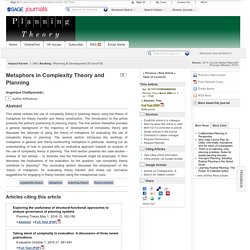
The introduction to the article presents the author's positioning of planning theory. The first section thereafter provides a general background of the trajectory of development of complexity theory and discusses the rationale of using the theory of metaphors for evaluating the use of complexity theory in planning. The Design Way: metaphysics. Evil, splendor, and the guarantors of destiny & design This blog post attempts to summarize Section IV: Metaphysics of Nelson and Stolterman’s “The design way” (TDW: 2012, 2003), see also the six previous posts.

TDW merges several intellectual traditions, including Churchman’s systems approach, which also inspired our own book “Wicked Solutions.” It is not surprising that there are interesting parallels between the books, some of which we are happy to point out (to ourselves in the first place) at the end of this summary. How to strengthen innovation – good practice vs. emergent practice. The last week of June I had the privilege of attending a three-day training event with Dave Snowden, founder of Cognitive Edge and “mental father” of the Cynefin framework.

For me this was a great experience and although I had read a lot of stuff around complexity (also by Dave), there were still many new insights I got. Some things were new, others just became clearer. One thing that I knew but that was becoming more pronounced during the training is the differentiation between best/good practice and emergent practice. Systems thinking and evaluation. Impact Factor:1.906 | Ranking:Social Sciences, Interdisciplinary 11 out of 95 Source:2014 Journal Citation Reports® (Thomson Reuters, 2015) Evaluationevi.sagepub.com doi: 10.1177/1356389011421935 Evaluation October 2011 vol. 17 no. 4 395-403.

Managerialism in Complex Systems: Experiences of Strategic Planning in Non-Profit Hospitals. <div class="c-box-warning full-width-element" style="text-align: center; "><div style="margin: auto; padding:10px;" class="container"><b>For full functionality of ResearchGate it is necessary to enable JavaScript. Here are the <a href=" rel="nofollow" target="_blank"> instructions how to enable JavaScript in your web browser</a>.
</b></div></div> Abstract The aim of this study was to analyse strategic planning practices in complex systems by investigating the experiences of Brazilian non-profit hospitals. "Emergent Learning" Is an Oxymoron -e-Literate. In the introduction to Steven Johnson’s oft-referenced but seldom understood book Emergence: The Connected Lives of Ants, Brains, Cities, and Software, he describes emergent systems as follows: In the simplest terms, they solve problems by drawing on masses of relatively stupid elements, rather than a single, intelligent “executive branch.”
They are bottom-up systems, not top-down. They get their smarts from below. Human Relations. Authors Chris Hendry The management of change has become characterized by an atheoretical pragmatism, overfocused on the political aspects of the change process. Emerging interest in the learning organization provides an occasion to remedy this, by developing a theory of change which is more congruent with the requirement to build learning capacity within organizations. A complex systems approach to planning, optimization and decision making for energy networks. <div class="c-box-warning full-width-element" style="text-align: center; "><div style="margin: auto; padding:10px;" class="container"><b>For full functionality of ResearchGate it is necessary to enable JavaScript.
Here are the <a href=" rel="nofollow" target="_blank"> instructions how to enable JavaScript in your web browser</a>. </b></div></div> Managing emergent practice. What would happen if you called for closing your training department in favor of a new function? Imagine telling senior management that you were shuttering the classrooms in favor of peer-to-peer learning. You’re redeploying training staff as mentors, coaches, and facilitators who work on improving core business processes, strengthening relationships with customers, and cutting costs. You’re going to shift the focus to creativity, innovation, and helping people perform better, faster, cheaper. Emergent Practice Planning - Frances Ricks, Jennifer Charlesworth. Knowledge management. Emergent learning and learning ecologies in Web 2.0. Emergent Practice Planning.
Forbes Welcome. Moving toward emergent strategy: slowly, if at all. Emergent Learning is using your own work to become a learning organization. The Emergent Way: How to achieve meaningful growth in an era of flat growth. Emergent Strategy - Knowledge Center. Intended, Emergent, and Realized Strategies. Emergent Strategy. The Emergent Way: How to achieve meaningful growth in an era of flat growth.